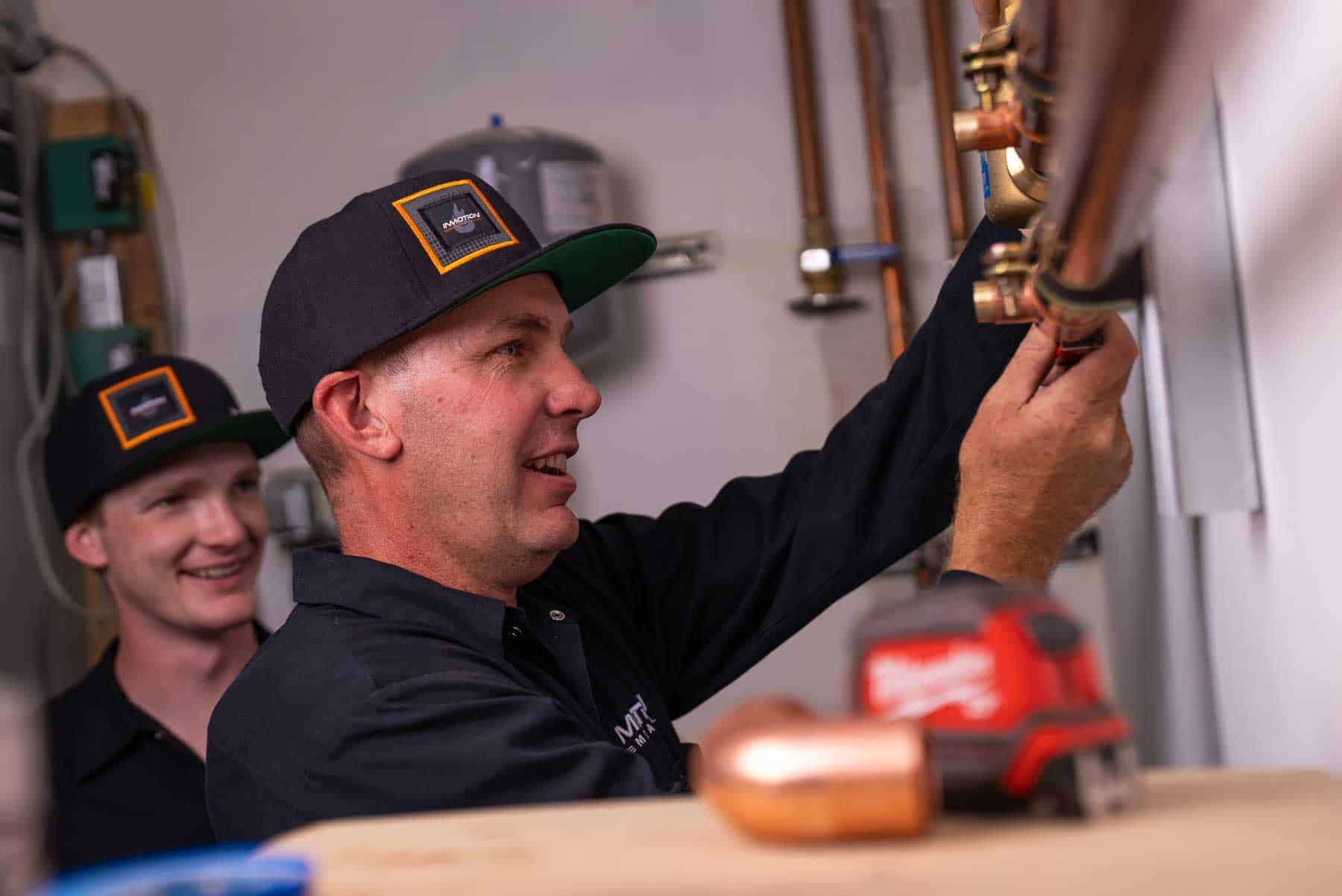Key Takeaways
Radiant heating offers:
- Consistent, quiet comfort: Hydronic systems deliver even heat across floors without noisy fans or fluctuating temperatures.
- Energy-efficient performance: Operating at lower temperatures than forced-air systems, these systems reduce energy usage and heating costs.
- Customizable zone control: Individual room settings offer precise temperature control tailored to each space’s needs.
- Low-maintenance longevity: With regular upkeep, hydronic systems provide long-lasting, reliable performance for whole-home heating.
Check out our hydronic heating services.
Understanding Radiant Floor Hot Water Heating Systems
Radiant floor hot water heating systems circulate warm water through tubing beneath the finished floor to deliver consistent heat across the entire space. This radiant heating system, often structured as hydronic radiant floor heating, operates quietly and efficiently, offering a seamless home heating experience.
The system providing this comfort uses either a water heater or a boiler to push warm water through radiant floor tubing below the surface. Hydronic heating is one of the most effective modern radiant solutions, balancing energy efficiency with wide compatibility across floor types.
How Hydronic Radiant Floor Heating Works
Every hydronic system starts with a central boiler heating water, then moves through radiant tubing installed above or within a slab. This process directs heat upward through the floor surface, creating gentle warmth across the room without circulating air. Water through tubing installed below the surface produces an even distribution of heat, keeping it where you want it, at your feet.
Systems can also be embedded in slab-on-grade foundations or integrated into subfloor panels for remodels. Hydronic radiant floor heating systems excel in creating customizable heating zones, allowing precise control of temperature room by room. This approach uses lower operating temperatures than systems like hot water baseboard or electric heat, making it more efficient.
Advantages Over Traditional Forced-Air Systems
Hydronic radiant floor heating systems deliver warmth without the interruptions, airflow noise, or dust circulation associated with forced-air systems. Because radiant energy is transferred directly to surfaces, the room warms up evenly, without swings in temperature or reliance on recirculated air. This heating technology ensures stable comfort at lower settings, which reduces heating costs over time.
Since there’s no ductwork, there’s nothing pushing allergens around. The benefits of radiant include cleaner indoor air, silent operation, and space-saving design. Systems are generally hidden from view and don’t require wall or ceiling units. With zone-based control, radiant floor heating becomes a premium home heating solution—both functionally and aesthetically.
Installation Considerations
Installing radiant floor heating systems calls for thoughtful design and proper sizing. The heater, whether a dedicated boiler or multi-use water heater, must match the size of the home and the number of heating zones. Heat pumps are often integrated to support low-temperature operations, especially when paired with radiant floor systems designed for efficiency.
Flooring materials matter. Tile and stone offer optimal heat transfer, but heating can be installed beneath most surfaces using appropriate installation methods. Hydronic systems are often ideal for whole-home use, while electric radiant and electric floor heating systems serve well in smaller zones or remodels. Electric floor systems, heated by electric resistance, bring convenience to bathrooms and entryways where fast warm-up is a priority.
Electric and hydronic radiant methods both offer advantages. Hydronic radiant systems provide greater energy savings for full-home applications or integration into heating and cooling plans. You can follow best practices for designing and installing hydronic radiant floor heating to optimize performance and efficiency during installation.
Maintenance and Longevity
All radiant heating systems benefit from regular maintenance. Annual inspections of the boiler system, radiant floor tubing, mixing valves, and zone controls help keep things running smoothly. Mineral buildup in the water in the system can reduce performance over time. Flushing the system protects internal components and maintains heat consistency across the floor.
Electric floor systems generally require less upkeep, but electric and hydronic radiant systems benefit from routine checks. Whether you rely on solar water heaters, a traditional water heater, or a high-efficiency boiler, preventive maintenance cuts heating costs and extends system life.
Reviewing these radiant floor heating maintenance tips is helpful to keep things running smoothly year-round. Hydronic radiant floor heating systems, when properly maintained, deliver excellent longevity and remain among the most dependable forms of home heating technology available.
Conclusion
Radiant floor hot water heating systems deliver one of the most efficient and comfortable home heating solutions. Whether retrofitting electric floor heating or installing hydronic heating as part of a full renovation, these systems can heat a home quietly, cleanly, and with impressive energy savings.
Their ability to maintain lower temperatures than systems that depend on forced air or baseboard convection gives them an edge in performance and efficiency. When paired with the right boiler system, water heater, or heat pump, modern radiant floor heating becomes the smart choice for long-term, reliable, and sustainable home heating.

